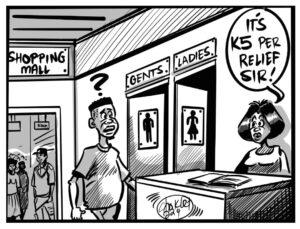Namwala UPND member of parliament Moono Lubezhi says it is frustrating to see President Edgar Lungu jogging every morning when the cost of living under his administration has continued “sprinting away”.
And Lubezhi has challenged Agriculture Minister Michael Katambo to tell the nation how much maize government exported outside the country during the 2017/2018 farming season.
Meanwhile, Lubezhi says it’s a shame that Katambo is now admitting that the crop production levels have dwindled despite earlier refusing to heed to advice not to lift the export ban.
She said in an interview that it was frustrating to see a president of the country jogging every morning when things were going bad under his charge.
“…Here we are everyday seeing people jogging on TV. We don’t need joggers. We need people who do proper management of the country. You are busy jogging and in the meantime the dollar is sprinting away from the kwacha, the bag of mealie-meal is at K110 but you are busy jogging. We don’t need a jogger, we need a president. Everything is busy sprinting away from him and he is jogging, no. Can we get serious once and for all,” Lubezhi said.
Meanwhile, Lubezhi wondered how people were going to survive with the announced reduction.
On Wednesday, Katambo told a media briefing that national maize production had dropped by 400, 000 metric tonnes from 2.4 million metric tonnes produced last season.
“The national average yield maize for maize has declined to 1.29 metric tonnes per hectare from 1.72 metric tonnes per hectare last season. Small and medium scale farmers have recorded an average maize yield rate of 1.24 metric tonnes per hectare, a reduction from 1.68 metric tonnes per hectare. The large scale farmers have recorded an average maize yield rate of 3.47 metric tonnes per hectare, a reduction in the total maize production and yields for the 2018/2019 season is largely due to the prolonged dry spells that were experienced in the growing season,” Katambo said as captured by ZNBC.
The Namwala member of parliament said they had warned about the severe implications of the drastic weather changes the country experienced but the government opted not to listen.
“The Minister of Agriculture finally has accepted that the production of maize has gone down. And these are the people whom we were telling that it’s not one farming block which is affected [by drought]. We told them that it’s not only one region that is affected by drought…but they argued on a mountain top and said whether one region like Southern Province is affected with partial drought [which to me] is not even a partial drought…As long as Southern Province is affected, whether we like it or not, the production of maize will go down. There is Central, Southern and Eastern provinces, these three, once they don’t harvest, then the production will go down. Now that the production has gone down, what are they going to tell us? How are people going to survive from now to the next farming season, which is in the next nine months? What are people going to eat?” Lubezhi asked.
She also challenged government to tell the nation how much maize it exported outside the country before the ban.
“We told them [that] don’t lift the export ban but they did. And in that export ban…this is a government which you can’t even hold accountable. Did they tell us how many tonnes of maize they exported during that period when they had lifted the ban? They didn’t. And the export which they made was for the 2017/2018 harvest, which would have filled the gap of this low production. So any normal human being should not have done what they did. Did they need a rocket scientist to see that a certain region had no rains? Why do they have Ministry of Agriculture in Southern Province? Why do they have offices all over? Is it not that they should be giving them correct information? They knew as early as December that Southern Province was not going to harvest anything,” said Lubezhi. “…So here we are now. So what next? Are they going to tell God to say ‘oh sorry we miscalculated please give us rains now?’ for me it all goes down to power leadership on governance. Speaking for Namwala, as I am talking to you, we have people who are still keeping…Urea, D-compound fertilizers in their homes. Why? Because they were given in March. Tell me was there any rain in Namwala for someone to start planting. They should have given them as early as October and since it only stopped raining in January, we were going to harvest. I am telling you it’s so frustrating to be led by people who do not know anything about the governance f the country. If only they could listen to what we were telling them, some of us who know about governance issues.”












